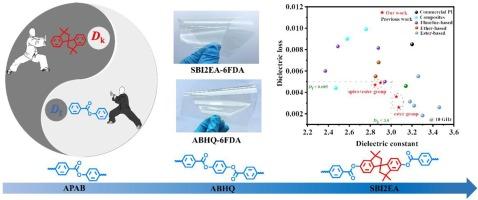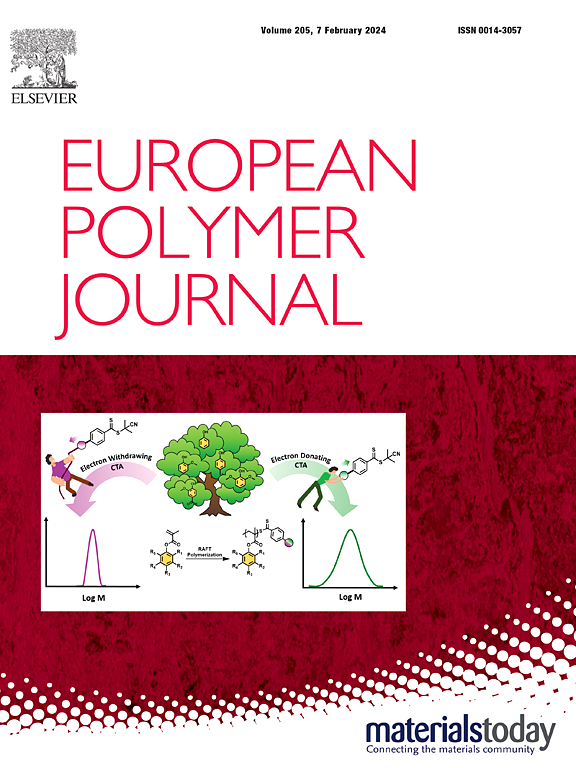具有超低介电常数、介电损耗和高无色透明度的可溶性聚酰亚胺,基于螺双茚双(芳基酯)二胺
IF 5.8
2区 化学
Q1 POLYMER SCIENCE
引用次数: 0
摘要
随着 5G 技术的出现,介电常数(Dk)和介质损耗(Df)相对较高的传统聚酰亚胺已无法满足超高传输和超低损耗的要求。尤其是降低聚酰亚胺的 Df 值已成为科学和工程领域的一大难题。本文提出了一种精心设计的低 Dk 值和低 Df 值聚酰亚胺的制备方法,该方法基于一对含有两个酯和螺双烯结构的二胺异构体(p-SBI2EA 和 m-SBI2EA),并将它们与 4,4′-(六氟异亚丙基)二邻苯二甲酸酐(6FDA)聚合。由此生成的聚酰亚胺薄膜显示出卓越的介电性能,在高频率(40 GHz)下,p-SBI2EA-6FDA 和 m-SBI2EA-6FDA 的 Dk 值分别为 2.83 和 2.88,Df 值分别为 0.0043 和 0.0048。有趣的是,引入螺双茚结构后,其在高沸点和低沸点溶剂中的溶解度都显著提高。此外,PI 薄膜还表现出完美的光学性能,截止波长(λcut-off)分别为 315 纳米和 321 纳米,在 450 纳米波长下的透射率分别超过 86% 和 89%,黄化指数(YI)分别低至 1.72 和 1.63。这些 PIs 的特性使其成为 5G 高频通信和光学领域应用的理想候选材料。本文章由计算机程序翻译,如有差异,请以英文原文为准。

Soluble polyimides with ultralow dielectric constant and dielectric loss and high colorless transparency based on spirobisindane-bis (aryl ester) diamines
With the emergence of 5G technology, the traditional polyimide with a relatively high dielectric constant (Dk) and dielectric loss (Df) are not suitable the requirements of ultra-high transmission and ultra-low loss. In particular, reducing the Df value of polyimide has become a significant difficulty in science and engineering. Herein, an elaborate design was proposed for the preparation of polyimide with both low Dk and low Df, based on a pair of diamine isomer containing two esters and a spiro-bis-indene structure (p-SBI2EA and m-SBI2EA), and their polymerization with 4,4′-(Hexafluoroisopropylidene)diphthalic anhydride (6FDA). The resultant polyimide films showed an exceptional dielectric property, with Dk values of 2.83 and 2.88, and Df values of 0.0043 and 0.0048 for p-SBI2EA-6FDA and m-SBI2EA-6FDA, respectively, at high frequencies (40 GHz). Interestingly, introducing the spirobisindane structure significantly displayed preeminent solubility in both high-boiling-point and low-boiling-point solvents. Furthermore, the PI films exhibited perfect optical performance, with cutoff wavelengths (λcut-off) of 315 and 321 nm, transmittance exceeding 86 % and 89 % at 450 nm, and yellowing indices (YI) as low as 1.72 and 1.63, respectively. The features of the PIs render them auspicious candidate materials for applications in 5G high frequency communication and optical fields.
求助全文
通过发布文献求助,成功后即可免费获取论文全文。
去求助
来源期刊

European Polymer Journal
化学-高分子科学
CiteScore
9.90
自引率
10.00%
发文量
691
审稿时长
23 days
期刊介绍:
European Polymer Journal is dedicated to publishing work on fundamental and applied polymer chemistry and macromolecular materials. The journal covers all aspects of polymer synthesis, including polymerization mechanisms and chemical functional transformations, with a focus on novel polymers and the relationships between molecular structure and polymer properties. In addition, we welcome submissions on bio-based or renewable polymers, stimuli-responsive systems and polymer bio-hybrids. European Polymer Journal also publishes research on the biomedical application of polymers, including drug delivery and regenerative medicine. The main scope is covered but not limited to the following core research areas:
Polymer synthesis and functionalization
• Novel synthetic routes for polymerization, functional modification, controlled/living polymerization and precision polymers.
Stimuli-responsive polymers
• Including shape memory and self-healing polymers.
Supramolecular polymers and self-assembly
• Molecular recognition and higher order polymer structures.
Renewable and sustainable polymers
• Bio-based, biodegradable and anti-microbial polymers and polymeric bio-nanocomposites.
Polymers at interfaces and surfaces
• Chemistry and engineering of surfaces with biological relevance, including patterning, antifouling polymers and polymers for membrane applications.
Biomedical applications and nanomedicine
• Polymers for regenerative medicine, drug delivery molecular release and gene therapy
The scope of European Polymer Journal no longer includes Polymer Physics.
 求助内容:
求助内容: 应助结果提醒方式:
应助结果提醒方式:


